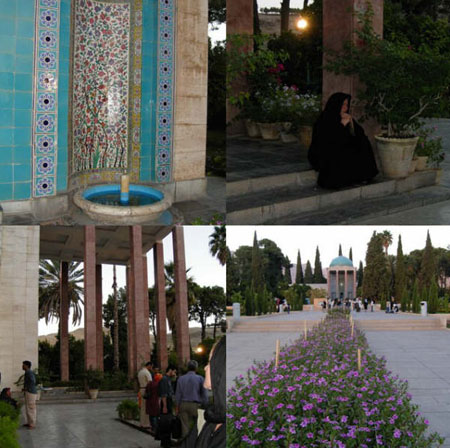|
Sa'adi's Viewpoints to be Published in Britain CHN Tehran, 6 February 2006 (CHN) -- One World Publication, a private publication in Oxford University, is going to publish a book entitled "Sa'di: The Poet of Loving and Living" on first of March 2007 in English language. It has also published several books on religion, Sufism, philosophy, and psychology.
This 160-page book is written by Homayoun Katouzian, Iranian researcher. Sa'di's viewpoints on love which depict both human and divine love, as well as the impact of his many years traveling had on his thoughts have been inscribed in this book. Katouzian shed a unique insight on the man he calls "the poet of loving and living". Using a philosophical and cultural approach toward Sa'di's life and literary works, Katouzian has revealed some aspects of love and life hidden in the works of this great poet who lived during the 13th century AD. In this book, Sa'di has been described as one of the greatest Iranian poets and writers who was highly skilled in classical prose and poetry and had a unique attitude on both human and spiritual love. Shaykh Muslihuddin Sa'di was born in Persia, the city of Shiraz, in 1184 AD. Sa'di's life may be divided into three distinct periods: Until 1226 he was busy with his studies; from 1226 to 1256, he spent his life as a traveler in different countries of the world; and the last part from 1256-1291 he spent as a Sufi contemplating and admonishing people. That is why he is remembered in Persian literature as a great moralist whose moral advices have been followed by those who heard them. Several pieces of his writings entered the daily life as valuable proverbs, giving precious lessons about life. Sa'di was reverted in his time as a man of great wisdom and passion. The body of his work was written in the thirteenth century. Filled with extract of the poet's melodious and insightful writing, and critical analysis thereof, this revealing biography examines why he was so idolized until the 1950's, and why since then he has fallen into relative obscurity. Homayoun Katouzian is a social scientists, historian, literacy critic and poet. He is the Iran Heritage Research fellow at St. Antony's College, and a member of the Faculty of Oriental Studies, University of Oxford, as well as an honorary fellow in the Department of Politics at the University of Exeter. Namehay-e Aasheghaney-e Nima Yushij
The American Poetry Review Forough Farokhzad Notes and Translation from the Farsi by Meetra A. Sofia The controversial and revered poet Forough Farokhzad (1935-1967) is Iran's greatest contemporary poet, one of the most influential writers of the Middle East, and one of the world's best loved women poets of the twentieth century. Forough was not only a polemical figure during her lifetime, but since her death her poetry has come to be a powerful anthem for freedom. During the Iranian Revolution, for example, students would publicly recite her poem "My Heart Aches for the Garden" in protest to the tyrannical Khomeini regime. In fact, her work was considered such a threat to the dictatorial policies that when her publisher refused to stop printing her poems, he was put into jail and his factory was burned down to the ground. With rare emotional depth, Forough's work is sincere, sensual, earthy, evocative, and an intriguing combination of love story, stormy passions, loss, betrayal, freedom, and most importantly, renewal. A poet of the 1960s, her poetry reverberates with issues of love and freedom and speaks to us as much today as when she first wrote them. * The Middle East has always posed a perplexing riddle to us here in the West. It is a land that woos our imagination with its sweet, enchanting culture, as well as bringing to life our shadow self in the guise of tyrannical leaders who perform atrocious crimes that terrorize humanity. Until we actually experienced this terrorism in our own backyard in New York, even though it has cost the people of the Middle East millions of lives from its inception decades ago, this oppression was knowledge we preferred not to dwell on and liked to keep properly muffled in the closet. But during the past several years we have all been catapulted into the lap of this paradox and have peered together through the same magnifying glass. We have watched in close-up, zoom, and slow motion and witnessed what happens when the Middle East, provoked by Western governments to display its machismo, publicly acts out its shadow self. Our consciousness becomes swollen with a deluge of appalling images, while the media broadcasts the nightmare. On the home front in the Middle East, however, terrorism has been a part of everyday life for many decades, especially for women. The large number of those remaining who were not able to join in the mass exodus out of these countries have had to take up the illusory act of being silent and dumb, while dutifully abiding by a set of laws plastered with human rights violations and forged into being by a group of fundamentalist Islamic men only for the benefit of a group of fundamentalist Islamic men. This canon of laws alone has been enough to amply fill reels of horror footage as rape, plunder, and looting of the female body and psyche takes place in the cradle of civilization as routinely as afternoon tea. But add to the Islamic Republic's "quirks" a religious heritage that amplifies the subordination of women and constructs its Heaven primarily for the benefit of its male citizens, and we're left with a myopic image of a woman who is forced to transform herself into a voiceless, thick-skinned pachyderm in order to survive. What happens then to a country that is unwilling to affirm the integral equality of its female population and treats a woman as a man's property? Is this a cultural enigma that affects women only or does it also affect men? Could this be what creates the dark side of the Middle East? This is a complex dilemma the world at large has been dealing with for millennia, and its roots can more often than not be found embedded in the ideologies of patriarchal narcissism. Since historically, however, it is the artists and not the politicians who record a culture's identity and who through their creative expression agitate, reject, and rebel against the status quo to change government, conceivably there is a poet or bard in Iran who could serve as our guide and help us understand the political dilemma in the Middle East.
Why should I stand still? As far as the eye can see Why should I stand still? What can a swamp be? The marriage of newspaper and ink is useless The ultimate end of all forces is unification I will take the unripe sheaves of wheat to my breast In the land of dwarves What do the long savage howls
The crow flew over our heads With a shrill cry Everyone knows Everyone is scared The gossip is not about the embrace of a couple The gossip is about my blissful hair The gossip is about the silvery life of a song At night from the wild rabbits Everyone knows We have found life in an eternal moment The gossip is not of scary whispers in the dark The gossip is about our hands intertwined in love Come to the meadow The curtains are bursting open with
I took my clothes off in the delicious air The water was cool and moved in dazzling waves Suddenly from around it a wind rose Fulfilled and rocking with joy Restless, thirsty, fevered, and overflowing with kisses
|

